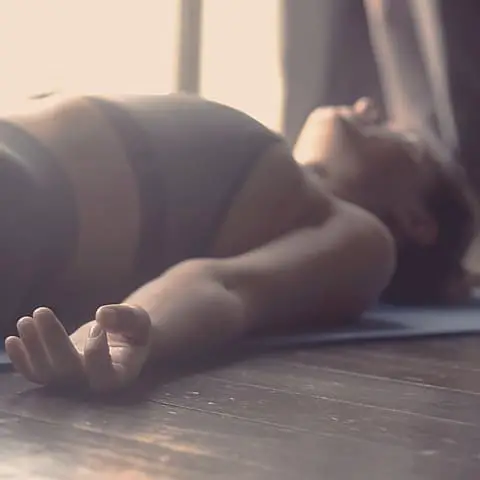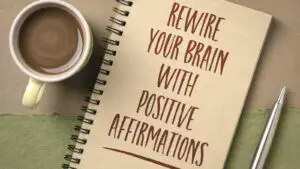If you are one of the many people globally who suffer from anxiety, you can understand how disabling this disease can be. However, the good news is that the global anxiety epidemic has initiated a lot of research, all of which has conclusively demonstrated the many benefits that meditation can have in controlling the symptoms of stress and anxiety.
Meditation is one of the most powerful ways to help control anxiety symptoms. By focusing our concentration on one specific thing and consciously bringing ourselves back to the present moment over and over again, we can learn to calm our minds, stay in the present, and ultimately control feelings of anxiety.
This article will dive deeper and explore why consistent meditation practice is so beneficial towards controlling anxiety, what we can expect from meditation, and how we can begin this powerful practice.
How does meditation help with anxiety?
Anxiety is the world’s most significant mental health problem. Around 4% of the Earth’s population suffers from anxiety disorders across all sexes, age groups, and across most countries. Spiritual practices such as meditation are proven to help calm and control an anxious, nervous system and reduce some of the debilitating symptoms associated with anxiety and stress disorders.
One of the primary purposes of meditation and other spiritual practices is to become a master of our nervous systems. We essentially start to train our minds to acknowledge any negative thoughts, breathe through them and come back to the present moment, where we practice meditation in a safe and calm space.
Once we can practice this state of focus to stay in the present moment without replaying past memories or worrying about the future, we can accept a sense of calm – and control whether or not we elicit an anxiety ‘fight-or-flight’ response to certain situations. We might still live with the same conditions and situations, but the anxiety response elicited by our nervous system can be controlled.
Meditation helps us be more in control of our reactions to the world around us and helps us to create a space between ourselves and the stories of our lives
In fact, anxiety can only be controlled when we learn to regulate how our nervous system reacts to situations that we find ourselves in. If you are in a state of anxiety, the nervous system is the first thing that must be controlled before even thinking about diet and medicine.
What is meditation?
The practice of meditation is thousands of years old and has been dated back to 500BC by historians. It’s practiced in cultures all over the world and by nearly every religion, including Hinduism, Christianity, Islam, Buddhism, Taoism, and many others.
Meditation is the practice of focusing your mind, consciously being in the present moment, and coming to stillness. Meditation usually incorporates goals such as increasing self-awareness, calming our mental activity, and managing emotions and thoughts.
So, let’s look at some key benefits that may explain why humankind has practiced meditation globally for so many thousands of years. And which of these benefits can help us control and ultimately reduce the symptoms of stress and anxiety.
The benefits of meditation and how they can help to control anxiety
Anxiety is something that we all suffer from at some point and to some degree. Unfortunately, many people live daily with this disabling disease.
Anxiety can be overwhelming, all-consuming, and scary.
So, finding ways to control the symptoms of anxiety through meditation that we may experience in our daily lives is becoming increasingly important for us all, with the following benefits:

- Meditation can control the symptoms of anxiety by helping us to be in the present moment – letting go of negative thoughts of the past or worrying about the future.
- Meditation produces feelings of deep relaxation, which helps us regain focus and eliminate the numerous different thoughts and worries that race through our minds and sometimes take over when we’re experiencing symptoms of anxiety, heart palpitations, or even panic attacks.
- After a regular practice of meditation, we can naturally increase our levels of compassion for ourselves and others, helping us become more resilient to symptoms of anxiety and stress.
- Meditation can also help to reduce other diseases in our bodies, such as chronic pain, depression, and high blood pressure.
Meditation is scientifically proven to help control symptoms of anxiety
Meditation is not just for religious gurus, hippies, and spirituality practitioners. Research shows that even a short-term practice of meditation can start to initiate changes in your brain to control your anxiety and stress response.
For example, studies conducted in 2016 found that practicing regular meditation resulted in structural brain changes, supporting improved emotional regulation, which enabled the subjects to control their symptoms of anxiety. The effects of this study appeared after only eight weeks of practice.
The 2015 Yale university study on the ‘Default Mode Network’ (DMN) of our brains found that mindfulness meditation decreased activity in this part of the brain. Typically, activity in the DMN results in being anxious, restless, and less happy. In fact, a 2017 study undertaken at the University of Massachusetts’ Centre for Mindfulness showed proven benefits to controlling and ultimately reducing a person’s anxiety levels both physically and mentally even years later after following an 8-week meditation course.
Scientific research backs up the importance of meditation for our mental health with comprehensive research. The new findings are regularly being presented even now, as scientists go deeper into analyzing which meditation types are the best to control anxiety symptoms.
Types of meditation to control anxiety
There are many types of meditation – and the good news is that ALL of them can help you control the symptoms of anxiety.
Nevertheless, among those different styles of meditation, there are three popular and effective meditation styles for controlling anxiety symptoms:
Mindfulness meditation
Mindfulness meditation is one of the most popular forms of meditation to control anxiety. It helps to acknowledge any difficult feelings, worries, painful memories, or emotions and accept them without judgment or encouragement.
Mindfulness meditation can help you reduce overly reactive instincts to stress factors, stopping you from becoming overwhelmed by things happening around you, and ultimately assisting you in controlling the symptoms of anxiety.
Movement Meditation
While most meditations are done in a stationary position, movement meditation invites us to meditate while doing simple body movements and paying attention to the sensations of the body.
The practices of tai chi, qigong, aikido, and yoga asana are all forms of movement meditation. Simple movements such as walking can also induce a sense of calmness and meditation.
Movement meditation can be particularly helpful for people experiencing symptoms of chronic anxiety, who find it difficult to sit in stillness for an extended period of time, or their mind is racing so fast that it seems impossible to calm down and focus on the breath without overthinking.
Yoga Nidra

Yoga Nidra is becoming an increasingly popular way for people to control anxiety and stress. It is a form of guided meditation where the instructor will invite you to focus on consciously relaxing each body part whilst in a lying position.
Concentrating on moving from one to another area of your body through the yoga Nidra practice induces a feeling of deep relaxation and stops a busy mind from racing thoughts.
A lot of research has found yoga Nidra to be beneficial in helping to control severe anxiety symptoms, including posttraumatic stress disorder, depression, and stress-related insomnia.
In fact, the International Journal of Yoga Therapy published a research review in 2013, showing experienced yoga Nidra practitioners demonstrating delta brain waves (associated with the deepest levels of sleep and restoration) whilst they were awake and consciously practicing yoga Nidra.
How to start meditating to control your anxiety instantly?
With all of these benefits demonstrating the effectiveness of meditation to control anxiety and stress levels, you might be wondering, “how do I start?”:
- Find a space where you feel safe and will not be disturbed.
- Sit or lie in a comfortable position. Being on the floor for the practice will naturally start to ground your energy.
- Check-in with your body and notice how it is feeling.
- Start to focus on your breath. Breathe deeply. Our breath is one of the most powerful tools for being in the present moment. Throughout the practice, keep returning to your breath.
- Be aware of your thoughts. In the beginning, it is natural that your mind will begin to wander. Acknowledge your thoughts and let them go by – each time coming back to your breath. Breathe deeply.
- Find a sense of stillness wherever you can. If your mind wanders, try to focus on returning to your breath and being present. Breathe deeply.
- Stay in your meditation space as long as you feel comfortable.
Overall, be gentle on yourself. It may take some practice, but each time you take the time for yourself to meditate, you are likely to experience some form of beneficial feeling.
Remember that there is no wrong way to meditate. Allow yourself space to breathe. By observing the breath, you will create a sense of stillness and start working inwards to listen to your body, allowing you to connect deeply with yourself and let go of external thoughts, a racing mind, and any feelings of anxiety.
Are there any downsides to meditation?
Like all holistic, natural practices, meditation is not meant to replace professional treatment for serious medical or psychological concerns, but it may be a helpful and complementary addition to your current treatment.
With some physical or mental conditions, such as severe psychosis, posttraumatic stress disorder (PTSD), and epileptics, meditation has been found to worsen symptoms in some cases.
As such, it’s important to speak with your doctor before commencing any meditation practice.
Recommendations for using meditation to control anxiety
Meditation is a very personal, inward journey that only you can take, and you might be wondering how to discover the right meditation style for controlling your anxiety.
Here are some tips to help you on your way towards meditative focus, calmness, reduced levels of reactionary behavior, greater control over symptoms of anxiety, and maybe even spiritual enlightenment.
- Try out different meditation styles to see which feels right for you.
- Test different durations.
- See what times each day you may feel more focused and peaceful to aim for a regular meditation schedule.
- Try meditating when you are feeling most anxious, focusing on breathing deeply. As you breathe, visualize that you’re breathing in peace and calmness and breathing out any anxiety, fear, or worry.
- Keep a journal – record how you feel before and after each meditation to see what works best for you and how each session has affected your anxiety levels.
In closing
If you suffer from any type of anxiety disorder, meditation is an essential practice to include in your day. Meditation is scientifically proven to help master the nervous system and reduce any reactionary behavior that will put you in ‘fight-or-flight’ mode.
Mediation will help you reach a state of calm, reduce negative thoughts that may be racing through your mind, improve your ability to focus, and ensure deeper sleep patterns. Overall, meditation is a powerful tool that will improve your capacity to control symptoms of anxiety.





